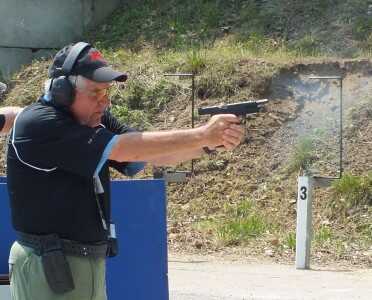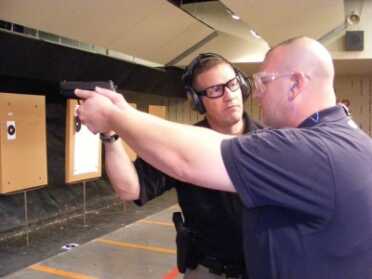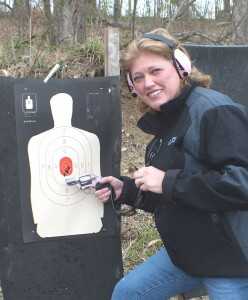
Practice can save your life: Competition can help you learn to manage pressure, improve your accuracy, and teach you to deal with malfunctions. If you feel nervous and don’t shoot as well as you thought you might in a match, imagine the pressure of a deadly force event.
Editor’s note: Dick Jones is a frequent contributor to GunsAmerica. He’s also recently authored Gun Digest’s Guide to Concealed Carry Handguns.
As a firearms instructor, Dick has given a lot of thought to the questions beginners often ask themselves. At GunsAmerica, we–the so-called-experts–often get lost in the intricate debates about caliber selection, or grip textures, and forget that we–all of us who know and love guns–are also ambassadors and educators.
Here’s Dick’s introductory lesson for those who are considering concealed carry–and for those who may need to reconsider their own habits. The views expressed are his. ~
#1 Now’s the time to get certified.
The face of gun ownership in America is changing. While there are no statistics to establish just how many new gun owners there are, anyone who works behind a gun counter will tell you the number is staggering and continuing to grow. Many of these people aren’t buying guns for hunting, competition, or as collectors. They’re buying guns for personal defense and signing up for the right to concealed carry. They’re doing this because they share the belief that an armed citizen is less likely to be a victim of a violent crime than an unarmed one. In some states over 10 percent of the population now has a concealed carry permit. While this is happening, long time gun owners who never considered everyday carry have begun carrying guns as part of their daily routines.
We may now have the highest percentage of citizens who are armed on a daily basis (at least since the beginning of the 20th century–maybe ever). In this burgeoning population of concealed carry citizens, it’s remarkable how few mistakes armed citizens make. During a recent internet search of newspaper and TV reports of incidents where concealed carry citizens wrongly used a gun as research for a book I was writing, I was hard pressed to find a single case of wrongdoing by licensed concealed carry citizen.
The message here is simple. If you haven’t gotten certified, now’s the time. Even if you don’t know if you would carry, or would even want to carry, you have the right to carry. You may bristle at the need for a piece of paper that allows you to exercise what is a Constitutional right. I understand that argument. Still, as the number of law-abiding citizens who carry firearms grows, we become more influential.
#2 Buy the ideal carry gun and gear
Many new gun owners purchase guns that don’t fit their lifestyle requirements and–because of this–they often leave them at home. Experienced gun owners sometimes insist on carrying guns they’re emotionally attached to, that are too large and heavy, and as a result, the guns stay at home or in the car. It is hard to defend yourself and your loved ones with the idea of a gun.
In many cases, shooting skills among concealed carry citizens leave a lot to be desired because many never really learned how to shoot properly. The vast majority of Americans who carry daily have received scant instruction during their concealed carry certification class. In some states, the class lasts only a couple of hours and several states require no class at all. The classes are often taught by individuals with little real world knowledge of shooting and poor and even dangerous advice runs rampant.
#3 You have to practice
While there’s no doubt concealed carry citizens are less likely to be victims, many are poorly prepared to deal with real life situations. The preponderance of concealed carry citizens simply don’t spend enough time shooting to operate their gun as a conditioned response, and most don’t practice on a regular basis.
Few concealed carry citizens actually practice drawing and shooting from their concealed holsters. Ammunition choices are made with little information about effectiveness. Few are prepared to handle malfunctions and have little idea of what represents the most effective shot placement.

Develop the skills: Spending time with a quality instructor will teach you the fundamentals you need for performance under stress.
#4 Practice situational awareness
Of course, there’s more to personal defense than effective shooting. Living your life in a state of situational awareness will probably do more to make you safe than simply carrying a gun. Where you sit in a public location and how you conduct yourself while walking down the street have a substantial influence on your level of safety.
These are habits you can practice, and should practice, daily. Everywhere. Especially where you feel most comfortable.
#5 Know the law
Complete and confident knowledge of the laws concerning the use of deadly force where you are is also invaluable should you have to execute your right and ability to use deadly force. Depending on where you live, you have a low risk or almost no risk at all of criminal prosecution, provided you use reasonable judgment in a deadly force event. On the other hand, you are almost certain to be sued, whether your assailant survives the event or not.

Know the Law: Using deadly force rarely results in being charged, but it almost always results in a lawsuit. A firm grasp of the law will go a long way in winning the almost inevitable lawsuit.
An intricate knowledge of the law, combined with mental preparation in considering different scenarios, will also allow you to use good judgment in conversations with law enforcement after the event. These conversations become public record and will be the first thing an attorney representing your assailant or the family of your assailant will review.
There’s no doubt an armed citizen is less likely to become a victim or a statistic, but daily life as a concealed carry citizen carries responsibilities. These responsibilities extend beyond what the law requires, they extend into your personal life and affect the ones you love and wish to protect. Being operationally prepared to protect yourself and them, being constantly aware of what’s happening around you, and knowing how to deal with the legal issues should you be required to execute your right to self-defense are just as important as the gun, ammunition, and holster you choose.


I\’ve wanted to attend a concealed carry class for a long time now, and I\’ve finally started the search to get going. Right now I\’m waiting on my gear and gun like you talked about. I just ordered a Glock 19 for my concealed carry, and I couldn\’t be more excited to get it and get the range time in! Thanks for the tips to get me going!
I think that it is great advice to be familiar with the law. Often, we don’t understand that different states have different laws. You want to be sure that you are doing what you can in order to make sure that you don’t get into trouble in regards to your second amendment rights. Do you have any other tips about getting a concealed carry permit?
Why do you have to sign up and or qualify for a right?
practice, correct firearm (not always daddy’s old colt ) and knowledge of the laws to me are the most important parts. we are blessed to have a F.A.T.S. simulator 4 miles away with knowledgeable staff (not salesman), that should be another tool to put in all our boxes.
You Betcha
You Betcha
Great list, but the one gripe is some do not have the range to shoot as they please. Strict rules make us incapable of firing from holsters. I know there is dry fire holster at home as well as lasers such as SIRT. But for some of us in certain areas, the real training is impossible.
Check out all the airsoft products available these days. The pistols have realistic weight, size, feel, manual safeties, the whole nine yards. Many have working slides as well. You can practice your draw, move while drawing, fire on the move, all legal and in your backyard or house. Better yet, get a like minded friend with the protective gear and rotate being the “bad guy”. Great way to hone skills.
I think that all five points are very good, but personally I would move #5 – Know The Law to #1. You might hold a concealed carry permit or few that mostly allow you to carry concealed in most states, but if you aren’t familiar with the firearm laws in those states and carry concealed, you might find yourself in some serious legal trouble. Know the laws of where you intend to carry, because if you get it or them wrong, none of the rest is going to matter. And keep something else in mind if you concealed carry as I do. If you find yourself in a situation where you might have to pull your firearm, an arriving law enforcement officer may not be able to make the split decision choice between who is the devil and who is the angel. They too are only human.
#6 READ Massad Ayoob’s book In Gravest Extreme at least twice.
Jeff’s comments are right on – I have a Sig .38 on my ankle in church – I hope I never am the only one there to have to save the preacher or the rest of the flock.
Charleston SC, Emanuel AME Church, June 2015. Proof that bad things can happen in good places and thus there are no absolutes. Easy to become complacent if you spend a lot of time in church and I have to admit prior to that incident church is one of the places I would leave the gun behind and I can carry anywhere without a permit (except NYC…). Kudos to you for not becoming complacent!
As a sworn police officer for 23 years now in a midwest city of 200k population in a state that allows licensed concealed carry, I can say your 5 points hit the nail right on the head. I will also say though that the majority of the people with concealed carry permits that I run across usually do #2 first because buying the coolest gun & concealed carry holster is the fun part, with not enough #3 to even know what fits them best. My favorite is people with holsters that have a spare magazine mounted on the holster. Then they go out and do #1 next, usually with very little #3 beforehand. Unless they have been a crime victim or have some military or police experience or know somebody who has some experience with #4, they have no baseline other than their own life experience or what they have read or seen on shows or YouTube to even know what is meant by situational awareness. #5 and the application of it in a real situation is rarely even a thought in anyone’s mind during the whole process.
I run across people not every day but at least several times a month that have concealed carry permits but are not carrying their weapon when I have contact with them. I always ask why and the answers vary but the common theme is “it is a pain in the ass” to carry their weapon, usually because they are going to or from work or they are going somewhere where they know they won’t be allowed to carry. I can completely understand that. I also ask those people if they have ever been in a situation where having a concealed weapon may have changed the outcome, and I have yet to run across anyone who says yes. It seems to me that the two main reasons people carry in the first place are #1 – 2nd Amendment rights advocate, and #2 – because it is cool.
Finally, there are no absolutes but I have to say that in the city, the people who are legally able to obtain a concealed carry permit (i.e. – not under firearms disability due to felony arrests) rarely if ever go to the areas in the city where they may need to make use of their right to carry. Sure, like I said there are no absolutes and there will always be some possibility of bad things happening in good parts of the city, but the further away you get from the “bad neighborhoods” the chances of that happening go way down. This is how the majority of people live their lives, and fortunately most people never have been in a situation where having a concealed weapon may have made a difference. What comes along with that is that unless people consistently think about and practice #4, complacency will set in and then people will start to lose interest in carrying at all. It’s when people go about their daily routines in places that they normally feel safe, that when something bad does happen, they are not prepared to deal with it whether they are carrying or not.
Anyway, great article. Sharing it on FB.
Great points you make. Thanks!
Well said, Jeff.
Very good article!
Is the Starbucks coffee mug supposed to be a jab?